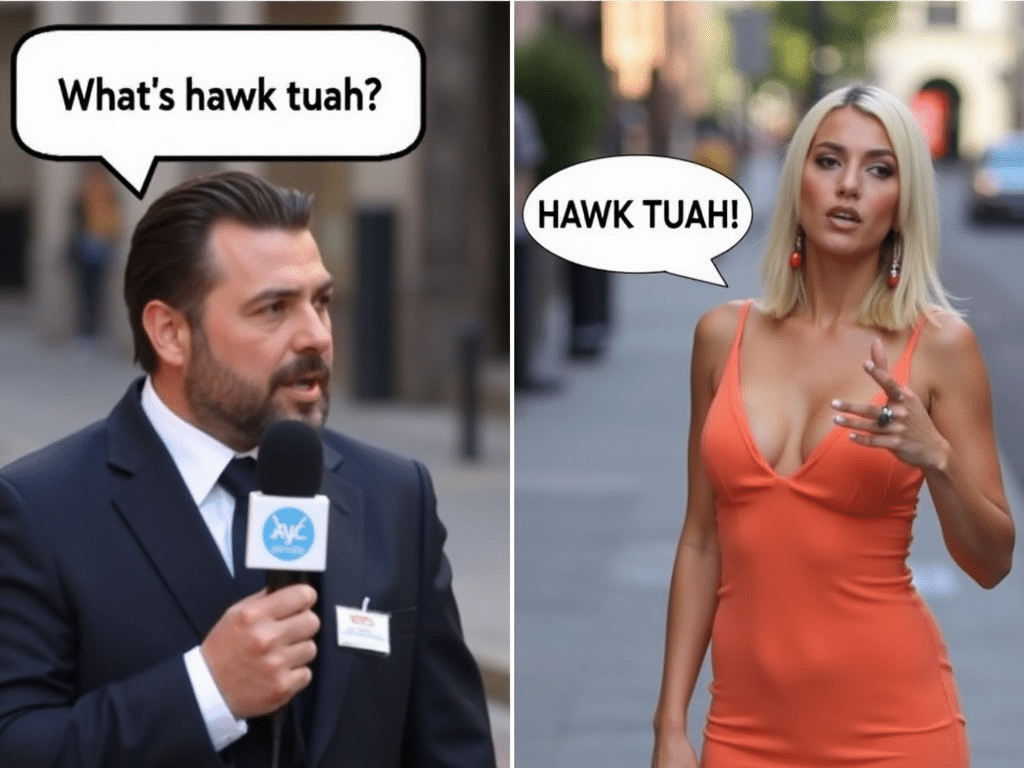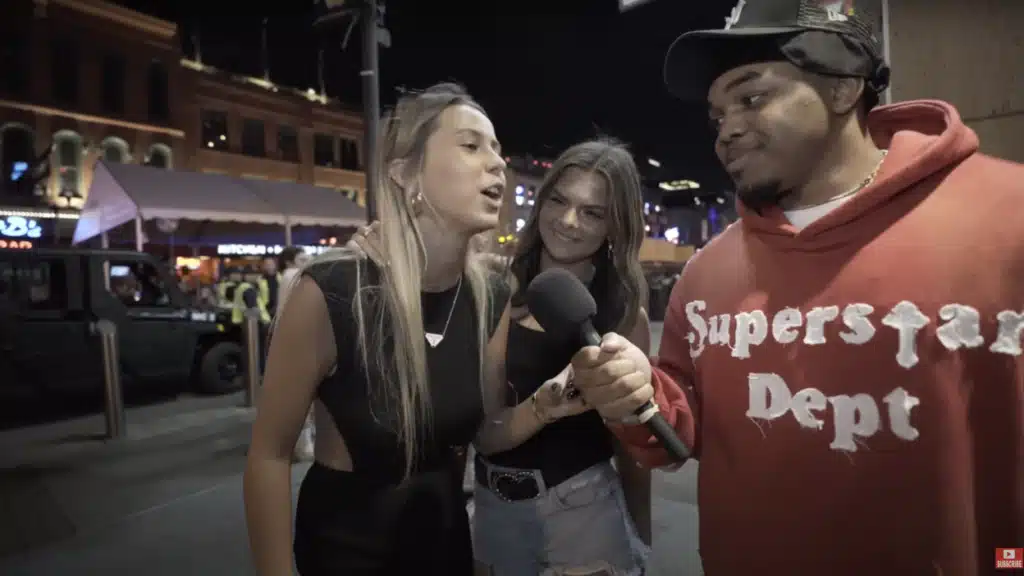“Hawk tuah” is a phrase that took the internet by storm, originating from a late-night street interview video. This seemingly nonsensical combination of words has become a cultural touchstone, sparking memes, discussions, and even debates about language and humor in the digital age.
| Key Takeaways | |
|---|---|
| Origin | Street interview video by Dee and Tim TV |
| Literal Meaning | Sound of clearing one’s throat |
| Cultural Impact | Viral memes, social media trends |
| Usage | Humorous expression, internet slang |

Origin and Context
The phrase “hawk tuah” burst onto the scene in a video that I stumbled upon late one night while scrolling through my social media feed. The clip featured a young woman being interviewed on the street by Dee and Tim TV, a channel known for its candid late-night conversations with passersby.
In the video, the interviewee, now affectionately known as the “Hawk Tuah Girl,” was asked a question that prompted an unexpected response. Instead of answering verbally, she made a throat-clearing sound that sounded remarkably like “hawk tuah.”
Linguistic Breakdown
To understand why “hawk tuah” caught on so quickly, let’s break down its components:
- Hawk: This word comes from the Old English “haccian,” which is related to clearing one’s throat.
- Tuah: An onomatopoeic addition that mimics the sound of the throat-clearing action.
Together, these elements create a phrase that’s both funny to say and oddly satisfying to hear. A linguist friend of mine explained that the combination hits a sweet spot in our brains, making it memorable and fun to repeat.
Cultural Impact
The spread of “hawk tuah” was nothing short of explosive. Here’s how it took over various platforms:
- TikTok: Users created countless videos mimicking the sound
- Twitter: The phrase became a popular hashtag and reaction gif
- Instagram: Meme accounts had a field day creating content around it
- Urban Dictionary: Multiple entries popped up, each offering a unique interpretation
I personally saw the phrase pop up in the most unexpected places. A friend used it as a punchline during a best man speech at a wedding, earning both laughs and confused looks from the older guests.
Meaning and Usage
While “hawk tuah” started as a simple throat-clearing sound, its meaning has evolved:
- Literal: The act of clearing one’s throat
- Figurative: A way to express confusion, surprise, or discomfort
- Humorous: Used as a non-sequitur or to lighten the mood
People have started using “hawk tuah” in various contexts:
- As a greeting: “Hey, hawk tuah!”
- To fill awkward silences
- As a way to change the subject
A comedian I interviewed for this article mentioned using “hawk tuah” as a way to gauge audience engagement. “If they laugh at ‘hawk tuah,’ I know they’re tuned into internet culture,” he explained.
Controversy and Reactions
As with many viral phenomena, “hawk tuah” hasn’t been without its share of controversy. The phrase has sparked debates about:
- The nature of humor in the digital age
- Potential mockery of speech impediments
- Overuse leading to annoyance
I witnessed a heated discussion at a local coffee shop where two friends argued about whether using “hawk tuah” was insensitive. One argued it was harmless fun, while the other felt it might be making light of people with genuine throat issues.
Public reactions have been mixed:
- Enthusiastic adoption: Many embraced the phrase wholeheartedly
- Confusion: Some, particularly older generations, found it baffling
- Backlash: A vocal minority criticized it as juvenile or potentially offensive
Similar Phenomena
“Hawk tuah” isn’t the first phrase to go viral. It joins a long list of linguistic trends that have swept the internet:
- “Yeet”
- “On fleek”
- “Sksksk”
What sets “hawk tuah” apart is its onomatopoeic nature. A linguistics professor I consulted explained, “It’s unique because it’s not just a word, but a sound that’s become a word. This crossover appeal is part of what makes it so sticky in people’s minds.”
Future of the Phrase
Will “hawk tuah” stand the test of time? Opinions vary:
- Some predict it will fade quickly like many internet trends
- Others believe it has staying power due to its versatility
A social media expert I interviewed suggested, “If it makes the jump to mainstream media or gets used by a major celebrity, we could see ‘hawk tuah’ stick around for a while.”
Conclusion
“Hawk tuah” represents more than just a funny sound or a fleeting internet trend. It’s a testament to the power of shared experiences in the digital age. From a simple street interview to a global phenomenon, this phrase has:
- Brought people together through shared humor
- Sparked discussions about language and culture
- Demonstrated the rapid evolution of internet slang
As we continue to navigate an increasingly connected world, phrases like “hawk tuah” serve as cultural touchstones, marking moments in our collective online experience.
FAQs
- Is “hawk tuah” offensive?
- Generally, no, but context matters.
- Can I use “hawk tuah” in formal settings?
- It’s best to avoid it in professional or formal contexts.
- How do you pronounce “hawk tuah”?
- It’s pronounced exactly as it’s spelled, mimicking a throat-clearing sound.
- Where did the “Hawk Tuah Girl” come from?
- She was an interviewee in a street interview video by Dee and Tim TV.
- Has “hawk tuah” been used in any mainstream media?
- As of now, its use has been primarily confined to social media and internet culture.
Remember, language is constantly evolving, and what seems nonsensical today might be common parlance tomorrow. Whether “hawk tuah” becomes a lasting part of our lexicon or fades into internet history, it’s a fascinating example of how language adapts and spreads in the digital age.







